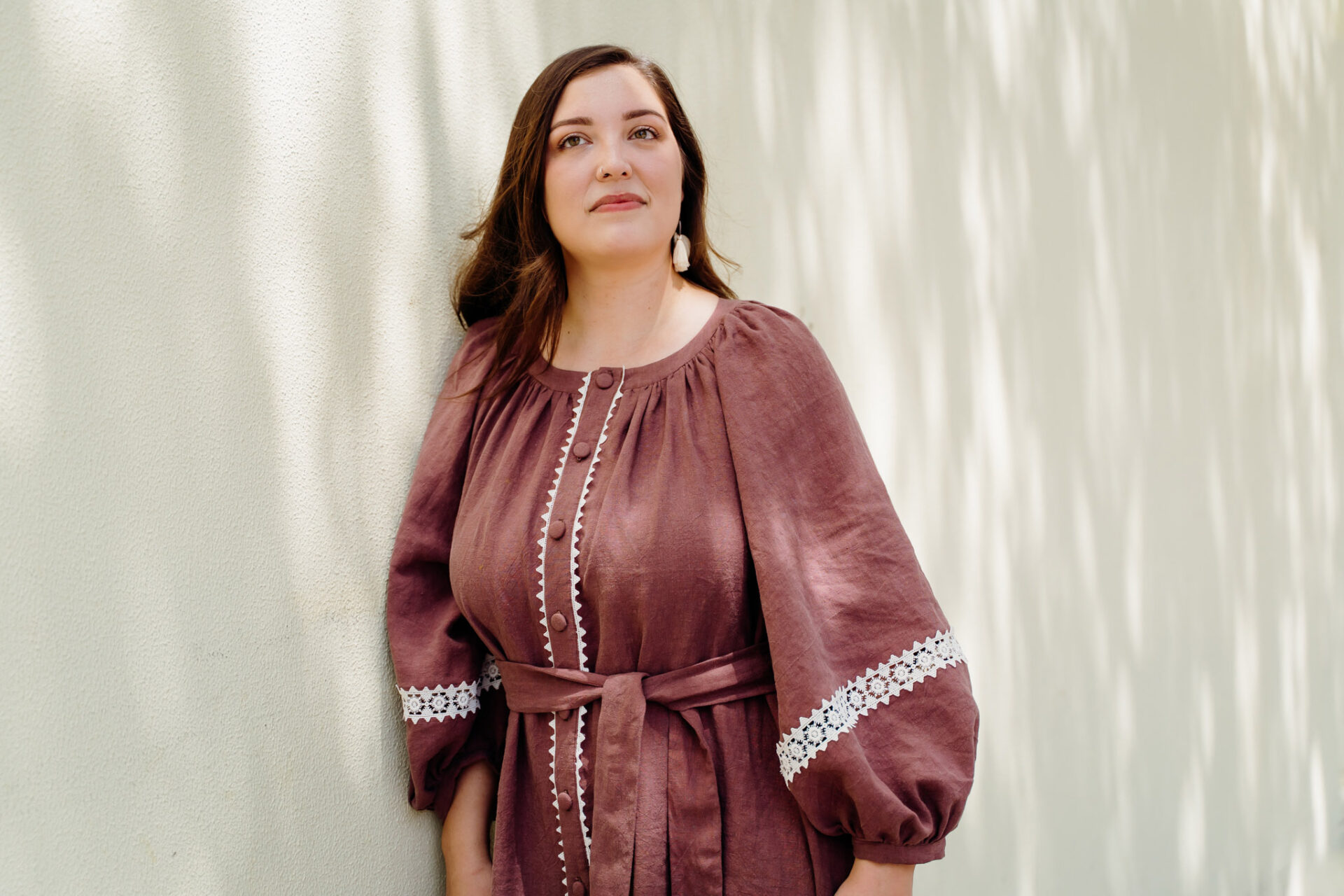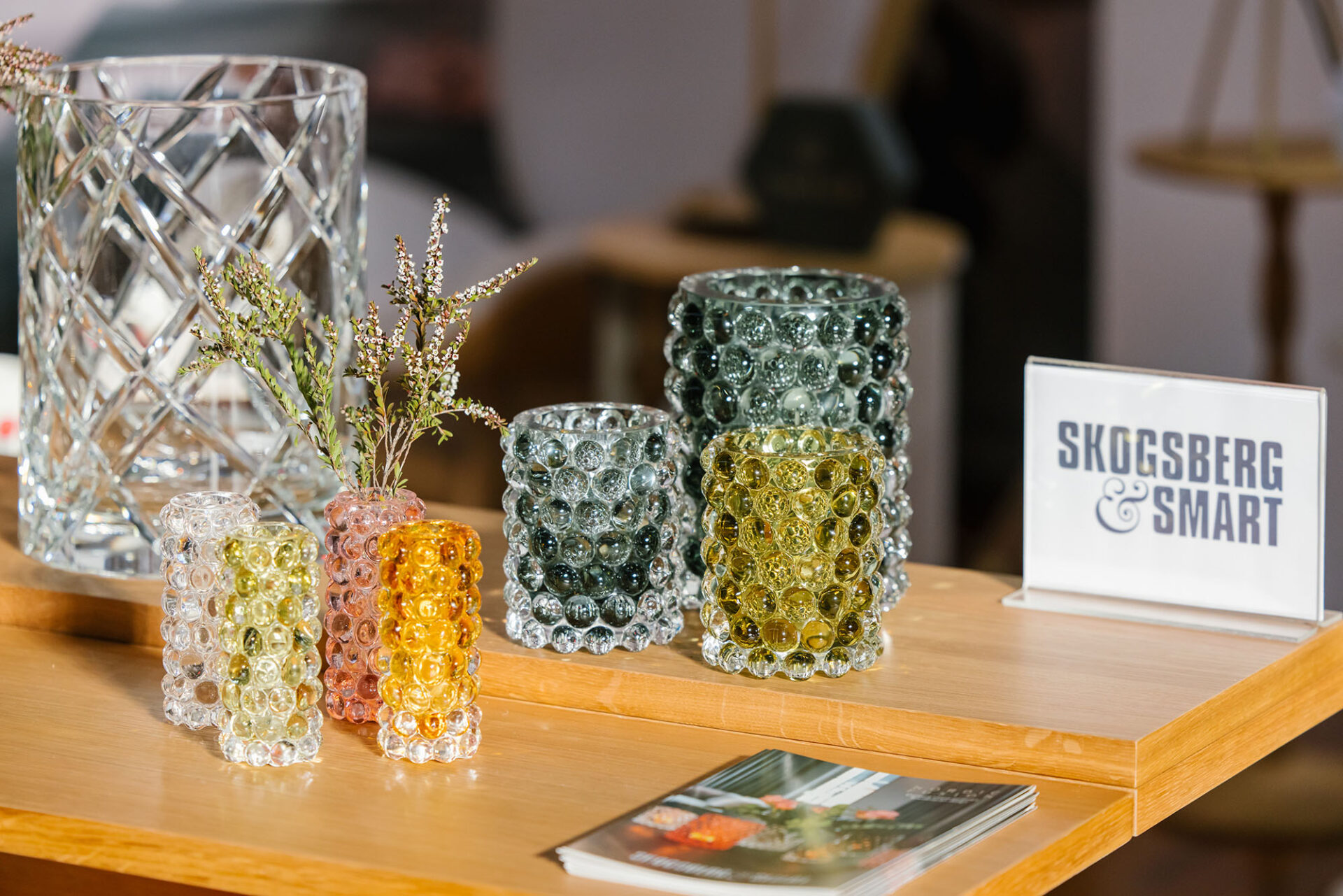Nice Rack! This Lovely Linen Brand Is Easy Like Sunday Morning
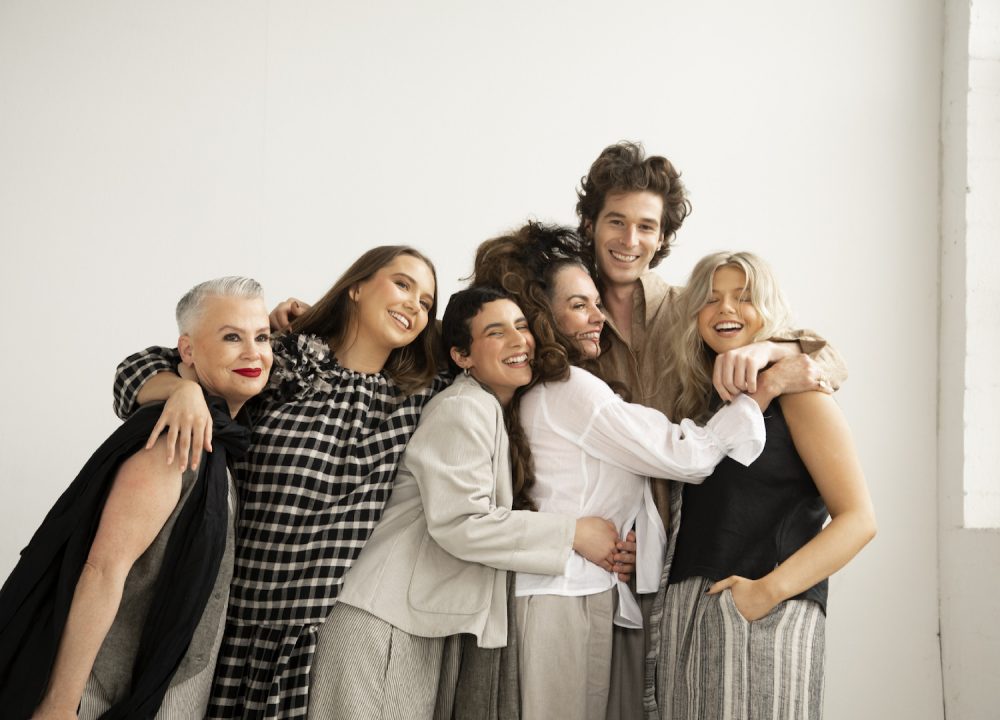
- Words by Peppermint
At the risk of stating the obvious, the clothes we wear matter. And not just in the sense of sartorial splendour and self-expression, but for those across the supply chain and beyond working towards a more sustainable fashion future. To celebrate these creatives putting people and planet first, we’ve introduced a digital series called Nice Rack! (…get it) so we can go behind the seams with some of our favourite sustainable brands, together.
Founded in 2015 by Nic MacIsaac, the independently owned, slow fashion linen brand, Eva’s Sunday boasts bold designs, luxurious fabrics and dramatic statement pieces. Perfect for trans-seasonal dressing, and with size options from 8 to 20, the Melbourne-based brand prides itself on working closely with customers to create and define a sense of personal style. Linen lovers, take note!
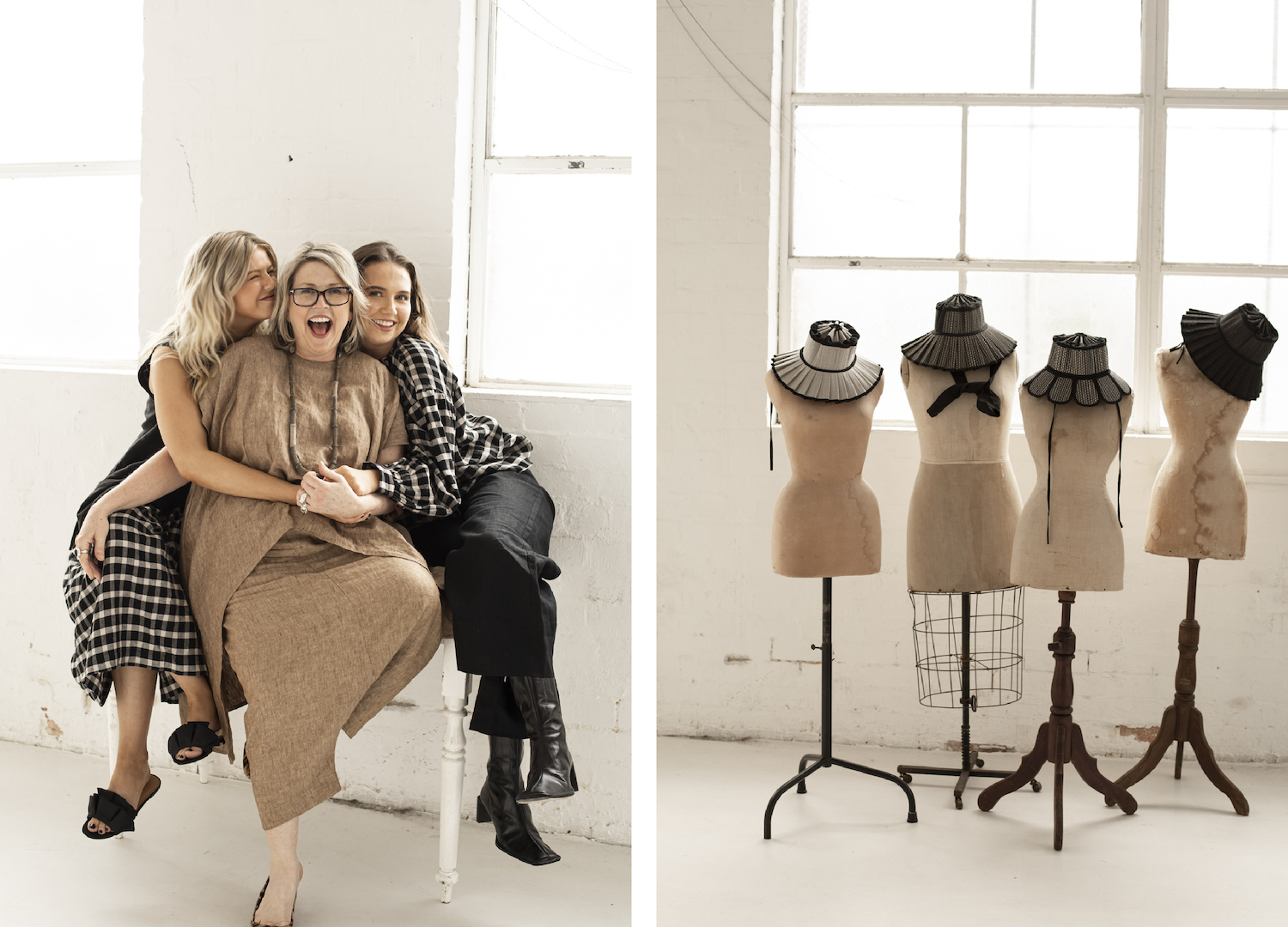
above left NIC AND HER TWO DAUGHTERS
Tell us about yourself…
My name is Nic, and I am the co-founder and CEO of Melbourne-based linen label Eva’s Sunday. I’ve been running the business for eight years, closely alongside an all-women team. I am passionate about this industry and have been involved in retail and manufacturing in one way or another since my children were born. They have grown up around sewing machines and fabrics.
To me, sustainable fashion is selling a garment to a woman who loves it, who wears it over and over for a long period of time, and then passes it on to her daughter because it’s got that inherent and intrinsic value.
What does sustainable fashion mean to you?
To me, sustainable fashion is selling a garment to a woman who loves it, who wears it over and over for a long period of time, and then passes it on to her daughter because it’s got that inherent and intrinsic value – it’s been well made, is well designed and well cut. They are timeless pieces that can be passed down to each generation. We provide our customers with high-quality, timeless and trans-seasonal pieces that don’t wear out – to me, that’s what true sustainability is.
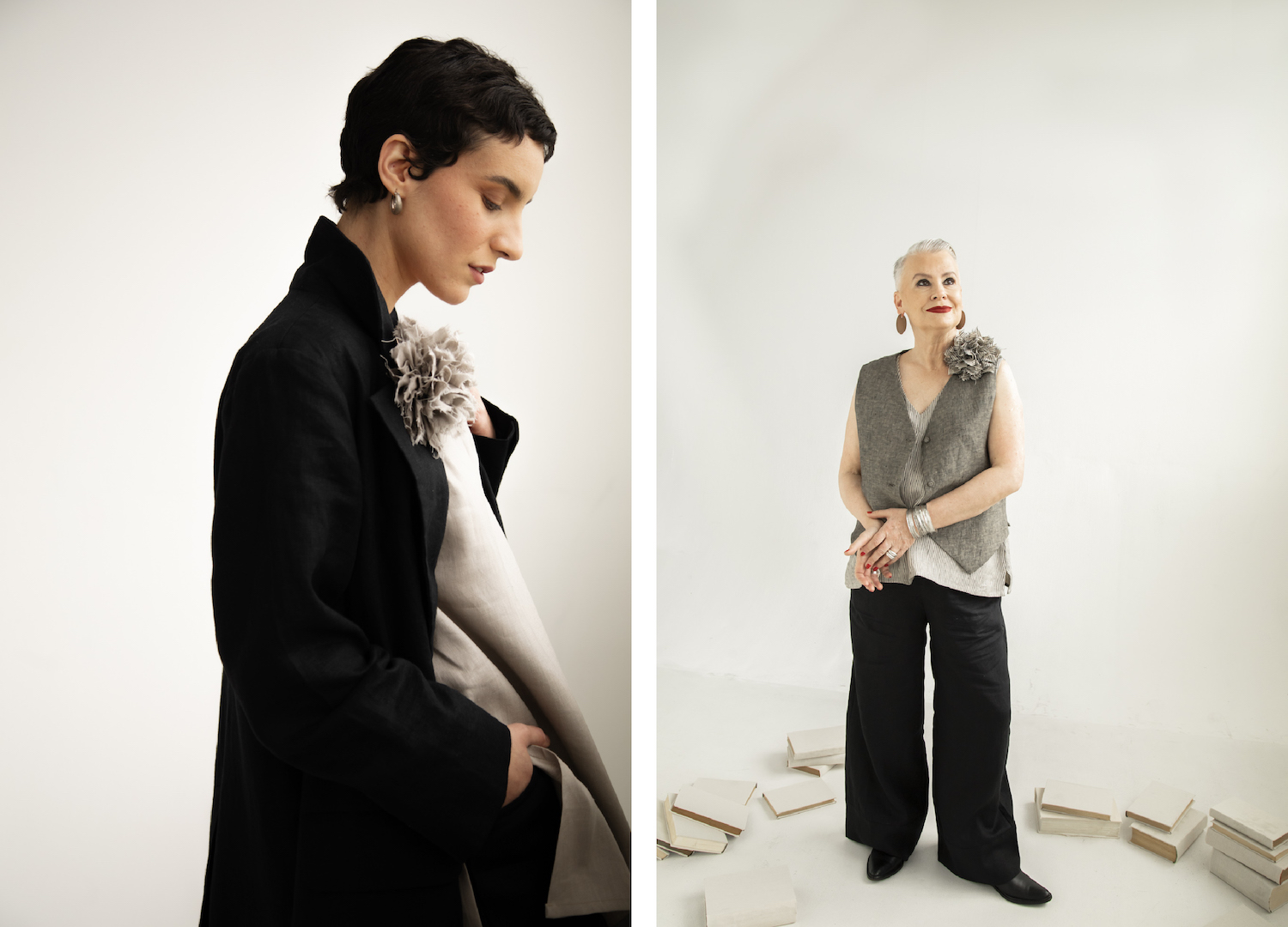
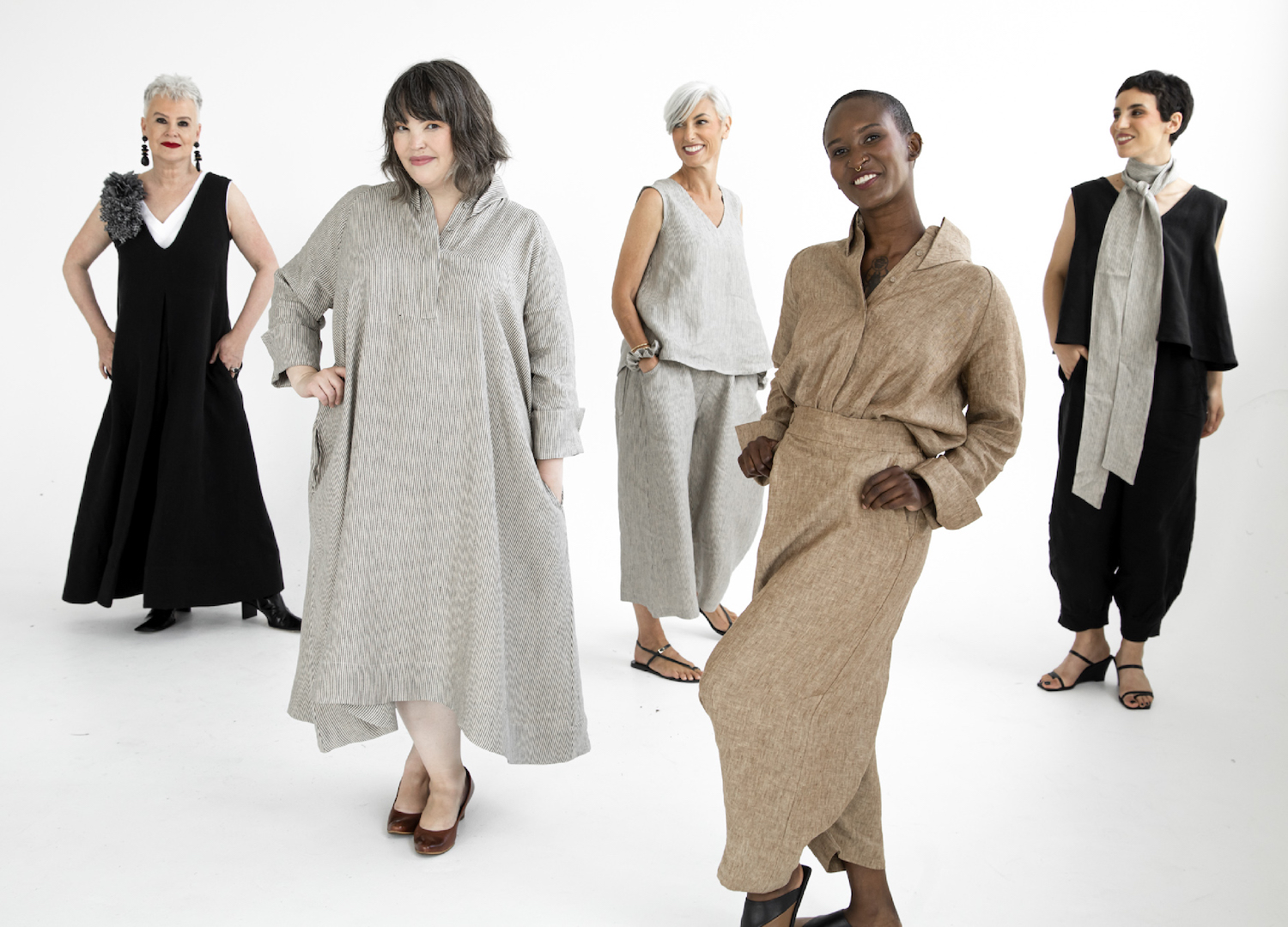
When did you know you wanted to get into fashion?
I started tinkering with fashion at a very young age when I started making dolls’ clothes. Fortunately, we had a sewing machine and my nanna was able to pass on some of those skills. I would sit there for hours making little clothes for my dolls, and as I got older, that turned into making clothes for myself. My very first business was when I was about eight years old, selling white t-shirts with splattered paint on them at a market stall, so it’s kind of been in me forever. When I got to my last years of high school, I decided to veer away from fashion and go down a conservative path, which led me to an accounting degree and launching my career in that field. Funnily enough, a full circle led me to start this fashion label eight years ago, and I couldn’t be happier – it’s my true calling.
We have been able to take a lot of women on a real journey of understanding and individualising their personal style. I love the idea that we have been able to help define that for a lot of women.
Why were you inspired to start your label and what continues to inspire you as a designer?
Having come from a business background but being a true creative, I loved the idea of merging the two. There’s always been a strong entrepreneurial drive within me. I guess I’ve happened to identify how to merge those two things into something that I’m absolutely passionate about. I love every single day I come to work. I don’t even consider what I do ‘work’ because it’s something I enjoy so much. Something that continually inspires me is the incredible feedback we get each and every day from our customers. I feel like we have been able to take a lot of women on a real journey of understanding and individualising their personal style. I love the idea that we have been able to help define that for a lot of women. The way we design clothes is based on a system of dressing where customers can build up a wardrobe, with styles complementing each other from one collection to the next; they are very much trans-seasonal pieces.
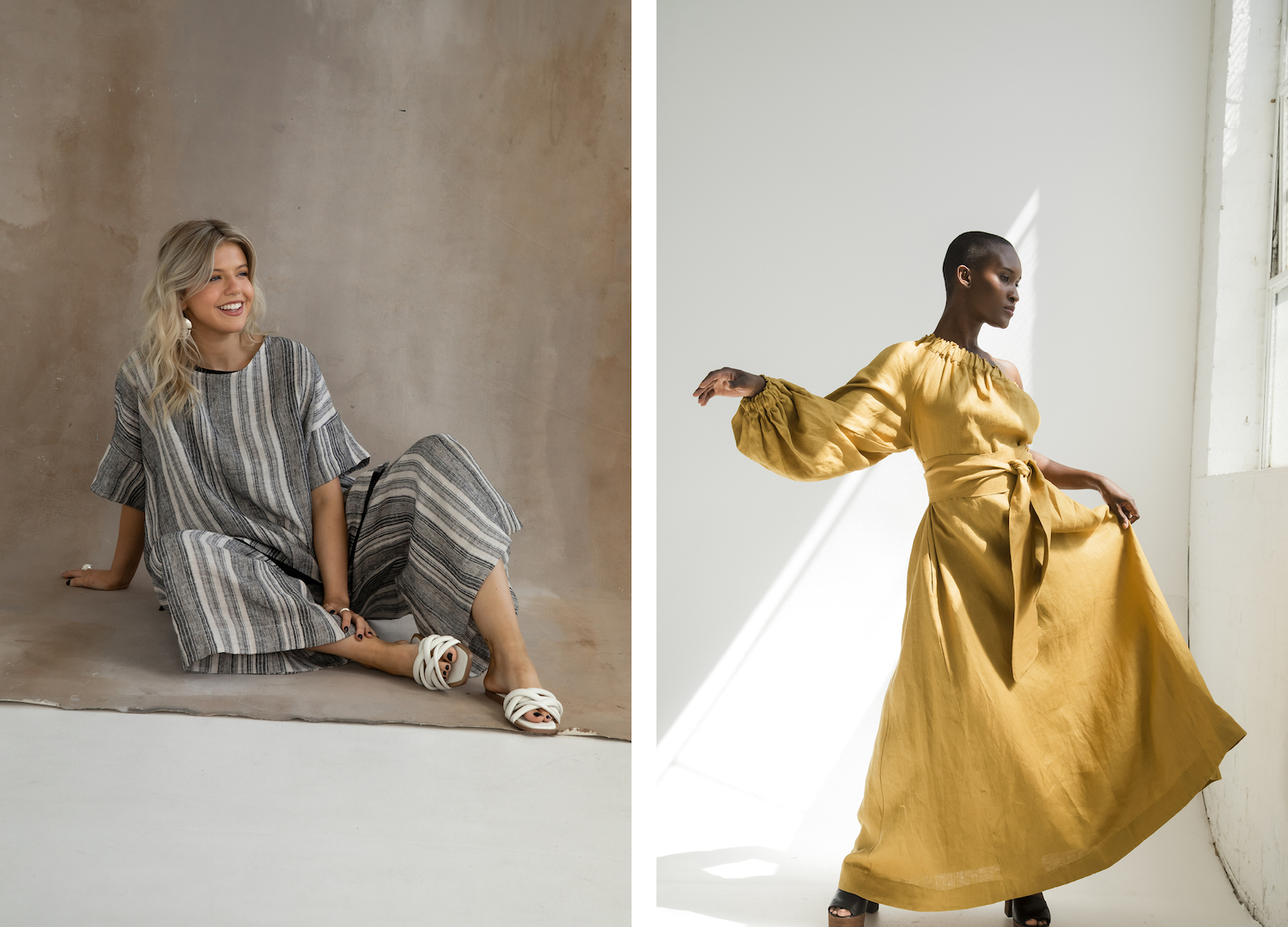
How do you incorporate sustainability/ethical practices within your brand?
We have a systemic and minimal wardrobe philosophy, allowing customers to create a capsule wardrobe. We don’t follow trends; we make every collection to communicate with the previous one where pieces complement one another. We are not a label that believes in marking down clothing at the end of a season, our clothes are designed to carry on to the next, remaining timeless. During COVID, we started an initiative called Gently Worn. Customers send us their pre-owned and loved Eva’s Sunday garments, we undergo a thorough process where we check these garments in-house to ensure they are in perfect condition and photograph them to be uploaded to our website.
We don’t follow trends; we make every collection to communicate with the previous one where pieces complement one another. We are not a label that believes in marking down clothing at the end of a season, our clothes are designed to carry on to the next, remaining timeless.
I love that it gives customers a great introductory price into Evas Sunday. I understand that our price point isn’t achievable for all, but I love that Gently Worn gives those customers a way in, and at the same time our customers can feel great about the fact that they have passed on clothes that for whatever reason didn’t get much wear to someone else who will enjoy and wear them. That to me is the true meaning of sustainability – where a garment can be worn until it is basically worn out.
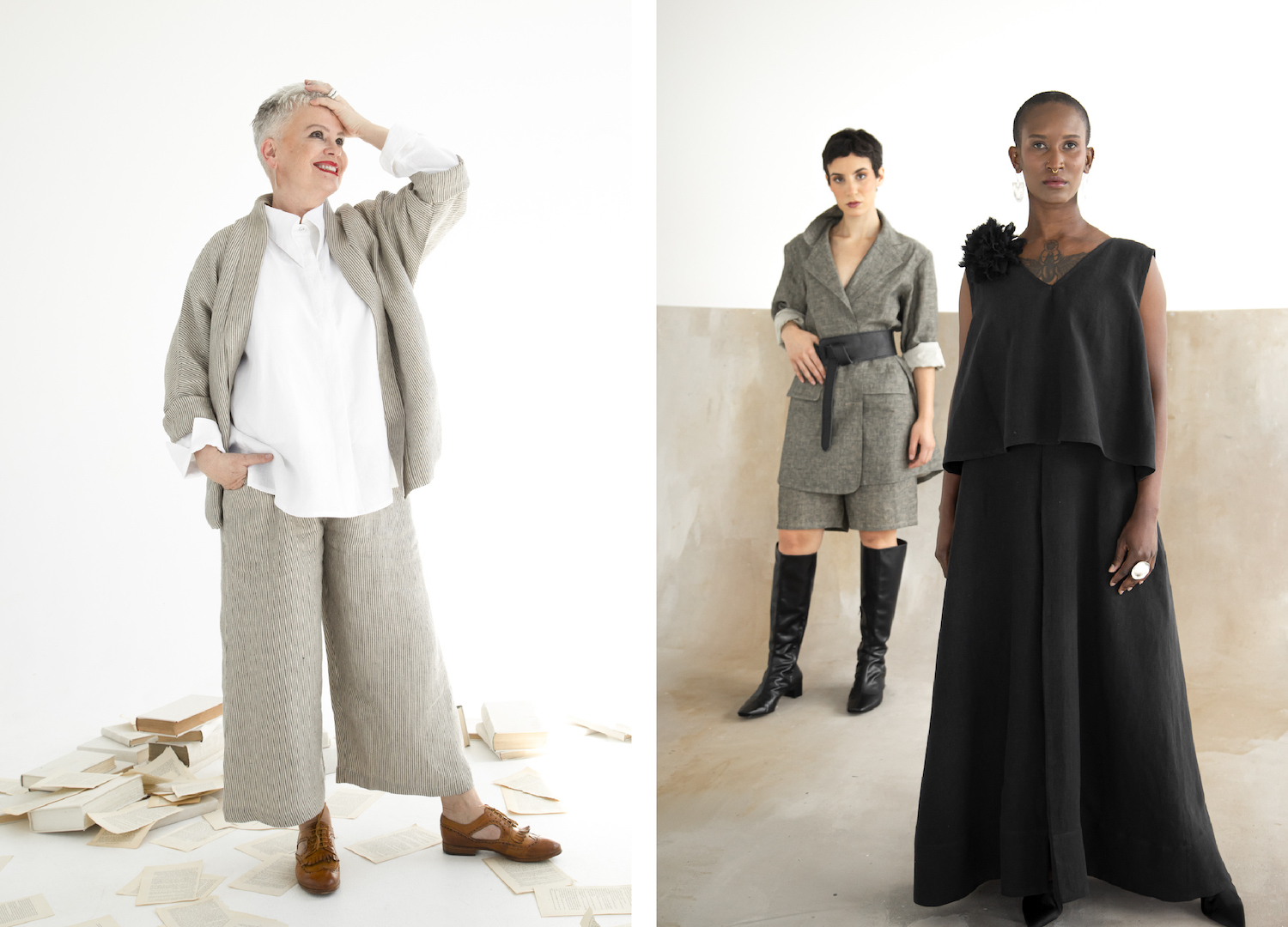
Tell us about any standout moments in your career…
I’ve been very proud of us in the last six months in particular. I feel like all the groundwork and hard slog of the last eight years has really come to fruition. We’ve made it through COVID having to really change our business practices, scaling back, and closing stores to survive. Ultimately it helped us focus on what makes this business successful – working closely with one another in an all-women team we have honed that knowledge and we’ve come to this really nice point where, eight years in, we are really seeing the fruit of our labour. Our online presence and e-commerce store have undergone a great period of expansion, and, in a couple of weeks’ time, we are opening a flagship store on Brunswick Street in Fitzroy, Melbourne!
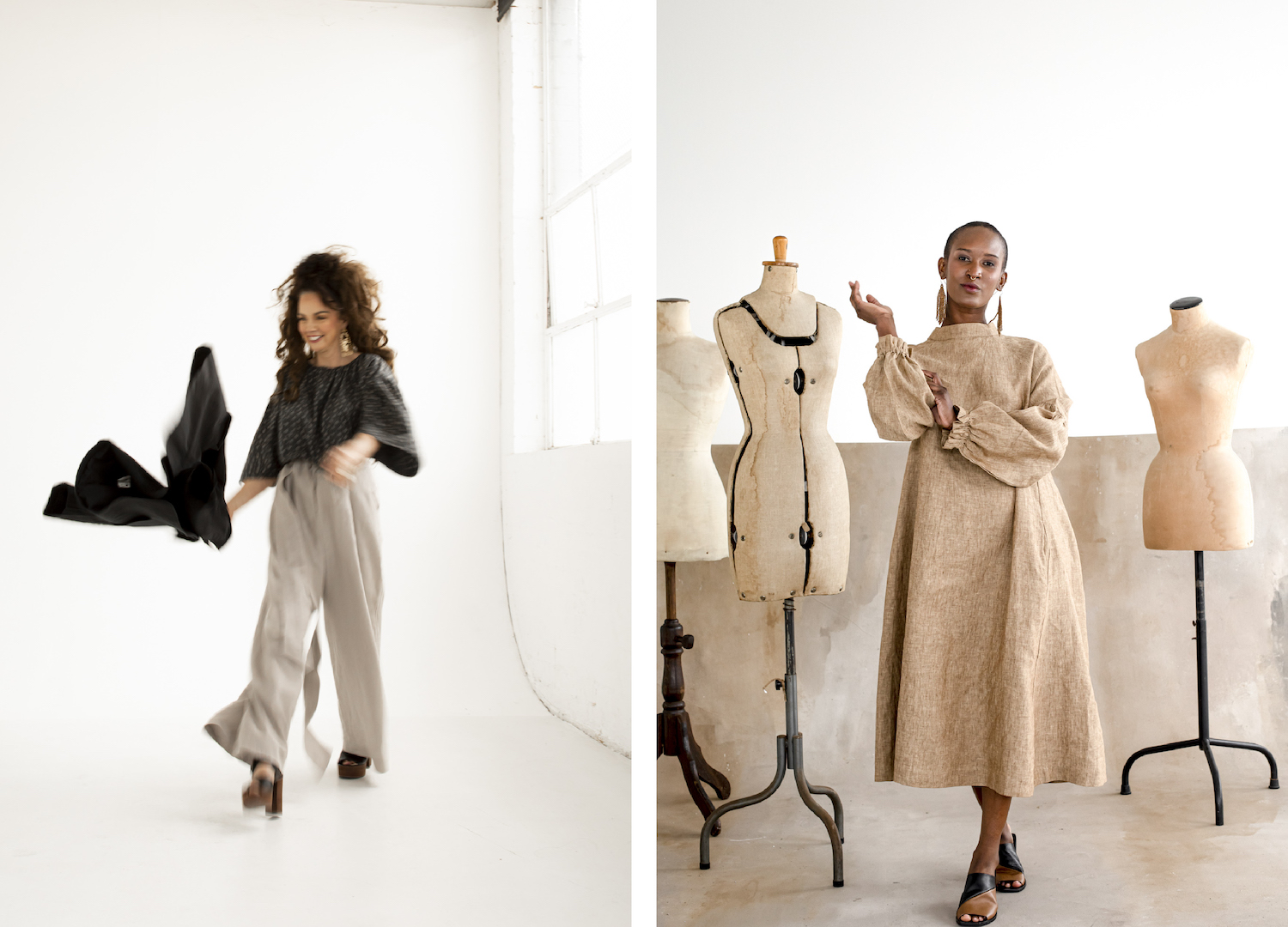
What are your favourite pieces to wear?
I love a drop-crotch pant – it’s not everyone’s favourite but we certainly have a big following for that type of style, and we’ve recently released a similar type of pant called the Koi Pant, which is a little bit different to a normal drop-crotch pant. It’s a little more harem in style but it’s completely and utterly Eva’s Sunday and we are really proud of how well it’s resonated with our customers. I also love our Riley Top, which is my version of an oversized t-shirt. I don’t wear t-shirts as they aren’t something I’ve ever been that comfortable wearing on my body, but, of course, a white t-shirt is a basic wardrobe staple. So, our version of that, the Riley Top, is something I love and wear a lot. Our Liberty pieces are always favourites of mine as they complement the solid linen.
In 2023, we are launching an essentials range, which identifies our best-selling staples. The idea is to ensure we are always in stock of those garments in black, white and navy so that customers know they can go to Eva’s Sunday to find their favourite essentials.
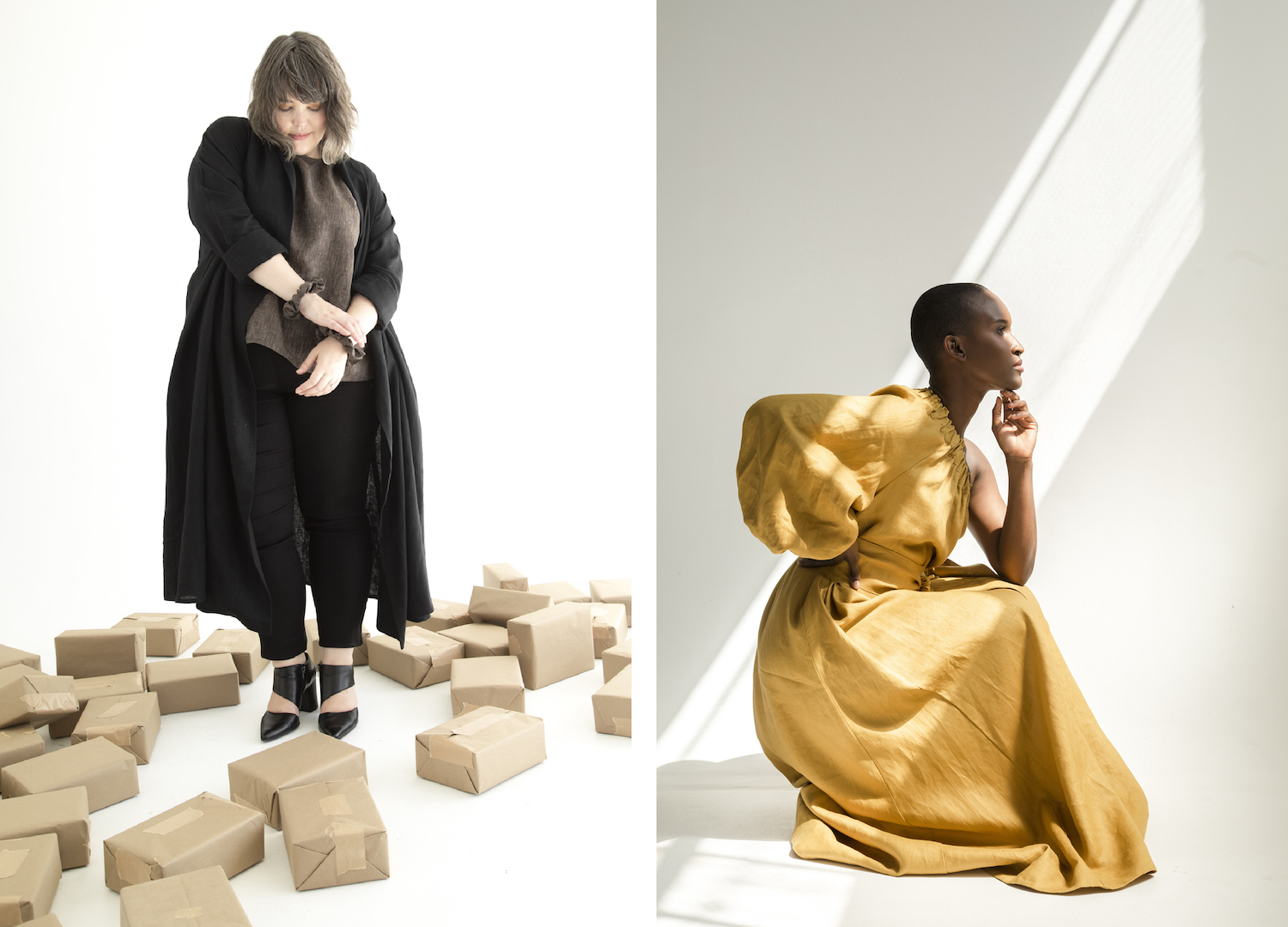
What do you think needs to change in the Australian fashion landscape?
We’ve worked really hard to get to the point that now we manufacture 50% of our ranges here in Australia. We work with an incredible female-owned factory based here in Melbourne. Their work is exemplary, and we are thrilled that we can now put 50% of our capacity through here, while the remaining 50% is with our Chinese manufacturing partner based in Changzhou. I think the issue with the Australian fashion landscape is that there is a shortage of skills here because the rag trade went offshore 30 years ago, a lot of the skills were lost, and the factories don’t exist anymore. The best thing that could happen is government support and funding for Australian manufacturing industries to invest in machinery. I think we are starting to see that now and consumers are making it known that they want Australian-made garments, and that they are prepared to pay a premium for that. It’s certainly an exciting time for more conscious production and consumption in the fashion industry.
WANT MORE SUSTAINABLE FASHION CONTENT? RIGHT THIS WAY!
JOIN OUR MAILING LIST
Brighten up your inbox with our not-too-frequent emails featuring Peppermint-related news, events, competitions and more!
explore
More articles
Look, I don’t want to make anyone panic but IT’S DECEMBER!!! If you’re planning to give homemade gifts, you’re going to have to act fast. …
Hang out with us on Instagram
🌻 The Paddington 🌻
This is a much-loved staple, created for Issue 50 in 2021. We love seeing the #PeppermintPaddingtonTop continually popping up in our feeds!
How stunning is our model Elon MelaninGoddessEfon – she told us it was one of the first times she had been asked to come to a shoot with her natural hair. 🌻
We worked with South African patternmaker Sarah Steenkamp of @FrenchNavyNow_ to create this wardrobe essential – the perfect puff-sleeve blouse. Raglan sleeves make it the ultimate beginner sew, plus the gorgeous back buttons let you add your own personal twist.
Pattern via the link in bio! 🪡
Photos: @KelleySheenan
Fabric: @Spoonflower
Model: MelaninGoddessEfon

“In the 1940’s, Norwegians made and wore red pointed hats with a tassel as a form of visual protest against Nazi occupation of their country. Within two years, the Nazis made these protest hats illegal and punishable by law to wear, make, or distribute. As purveyors of traditional craft, we felt it appropriate to revisit this design.”
Crafters have often been at the heart of many protest movements, often serving as a powerful means of political expression. @NeedleAndSkein, a yarn store in Minnesota, are helping to mobilise the craftivists of the world with a ‘Melt The Ice’ knitting pattern created by @Yarn_Cult (with a crochet pattern too), as a way of peaceful protest.
The proceeds from the $5 pattern will go to local immigrant aid organisations – or you can donate without buying the pattern.
Raise those needles, folks – art and craft can change the world. 🧶
Link in bio for the pattern.
Images: @Gather_Fiber @NeedleAndSkein @a2ina2 @KyraGiggles Sandi.204 @WhatTracyMakes AllieKnitsAway Auntabwi2
#MeltTheIce #Craftivism #Knitting #CraftForChange

TWO WEEKS TO GO! 🤩
"The most important shift is moving from volume-led buying to value-led curation – choosing fewer, better products with strong ethics, considered production and meaningful stories. Retailers have real influence here: what you buy signals what you stand for. At Life Instyle, this means using the event to discover and invest in small-scale, planet-considerate brands that align with your values and your customer’s conscience. Consumers don’t need more things; they need better things, and retailers play a key role in selecting, contextualising, and championing why those products matter."
Only two more weeks until @Life_Instyle – Australia`s leading boutique retail trade show. If you own a store, don`t miss this event! Connect with designers, source exquisite – and mindful – products, and see firsthand why this is Australia’s go-to trade show for creatives and retailers alike. And it`s free! ✨️
Life Instyle – Sydney/Eora Country
14-17 February 2026
ICC, Darling Harbour
Photos: @Samsette
#LifeInstyle #SustainableShopping #SustainableShop #RetailTradeEvent

Calling all sewists! 📞
Have you made the Peppermint Waratah Wrap Dress yet? Call *1800 I NEED THIS NOW to get making!
This gorgeous green number was modelled (and made) by the fabulous Lisa of @Tricky.Pockets 🙌🏼
If you need a nudge, @ePrintOnline are offering Peppermint sewists a huge 🌟 30% off ALL A0 printing 🌟 when you purchase the Special Release Waratah Wrap Dress pattern – how generous is that?!
Head to the link in bio now 📞
*Not a real number in case that wasn`t clear 😂
#PeppermintWaratahWrapDress #PeppermintPatterns #SewingPattern #WrapDress #WrapDressPattern

8 Things to Know About January 26 - from @ClothingTheGaps:
Before you celebrate, take the time to learn the truth. January 26 is not a day of unity it’s a Day of Mourning and Survival for Aboriginal and Torres Strait Islander peoples.
It marks the beginning of invasion, dispossession, and ongoing colonial violence. It’s time for truth-telling, not whitewashed history.
Stand in solidarity. Learn. Reflect. Act.
✊🏽 Blog written by Yorta Yorta woman Taneshia Atkinson.
🔗 Link in bio of @ClothingTheGaps to read the full blog
#ChangeTheDate #InvasionDay #SurvivalDay #AlwaysWasAlwaysWillBe #ClothingTheGaps

As the world careens towards AI seeping into our feeds, finds and even friend-zones, it`s becoming increasingly hard to ignore.
We just wanted to say that here at Peppermint, we are choosing to not print or publish AI-generated art, photos, words, videos or content.
Merriam-Webster’s human editors chose `slop` as the 2025 Word of the Year – they define it as “digital content of low quality that is produced usually in quantity by means of artificial intelligence.” The problem is, as AI increases in quality, it`s becoming more and more difficult to ascertain what`s real and what`s not.
Let`s be clear here, AI absolutely has its place in science, in climate modelling, in medical breakthroughs, in many places... but not in replacing the work of artists, writers and creatives.
Can we guarantee that everything we publish is AI-free? Honestly, not really. We know we are not using it to create content, but we are also relying on the artists, makers and contributors we work with, as well as our advertisers, to supply imagery, artwork or words created by humans. AI features are also creeping into programs and apps too, making it difficult to navigate. But we will do our best to avoid it and make a stand for the artists and creatives who have had their work stolen and used to train AI machines, and those who are now losing work as they are replaced by this energy-sapping, environment-destroying magic wand.
Could using it help our productivity and bottom line? Sure. And as a small business in a difficult landscape, that`s a hard one to turn down. We know other publishers who use AI to write stories, create recipes, produce photo shoots... but this one is important to us.
`Touch grass` was also a Merriam-Webster Word of the Year. We`ll happily stick with that as a theme, thanks very much. 🌿









